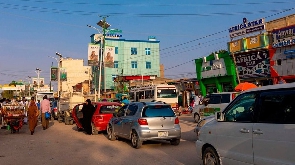Somalia authorities have over the past week been dealing with yet another mass displacement of people as conflict raged in Las Anod following an intensified confrontation between Somaliland forces and SSC (Sool, Sanaag and Cayn) militias.
Security experts fear that the problem may distract authorities from fighting Al-Shabaab, allowing the militants to infiltrate the area.
At least nine people were killed and another 14 wounded on Saturday in a sixth day of fighting in the breakaway Somaliland region, a local government official and a medic said, hours after Somaliland called for an unconditional ceasefire.
The fighting in Las Anod, the administrative centre of the Sool region, first erupted after a committee of local leaders, religious scholars and civil society groups said they no longer recognised the Somaliland administration and wanted to re-join Somalia.
Franz Celestin of the UN’s International Organisation for Migration expressed concern about the number of displacements in Las Anod town due to ongoing violence.
Life-saving support
“Tens of thousands of people need life-saving support, safety and security in an area which was already heavily affected by the drought situation,” Celestin stated on Wednesday last week about the deadly confrontations between the Somaliland forces and local militia loyal to SSC regions.
Dr Abdimajid Hussein from Manhal Hospital told BBC Somali Service on Wednesday last week that their resources are limited to copies with the casualties.
“We are receiving wounded people in need of assistance. We are trying our best,” Dr Hussein stated.
Ownership tussle
Some of the wounded were airlifted to Mogadishu for treatment by the National Disaster Management Agency.
Las Anod is claimed by both Somaliland, a breakaway region in the north, and Puntland, a federal state in Somalia. Somaliland had avoided the problem of Al-Shabaab which has seen most of southern Somalia struggle to re-establish institutions.
Last week, Somaliland authorities claimed they had arrested a Shabaab leader who showed up on the battlefront ostensibly to defend the people. These claims were rejected as propaganda by most of Somalia’s union enthusiasts.
But the Somaliland Council of Ministers stated on Wednesday saying the region is “at war with international terrorist groups that have been planning on creating insecurity, and instability, and carrying out attacks in Las Anod for some time.”
Alarm on terrorism
If Al-Shabaab’s claims are proven, it may mean the militant group has used the chaos to penetrate one of the regions where it had failed to establish itself in the past.
Rashid Abdi, a Horn of Africa researcher, indicated that Somaliland should not be brushed aside for raising the alarm on terrorism.
“Somaliland intelligence is one of the best in the Horn. A few years ago, Somaliland-generated intel led to a global operation that foiled major attacks. Those who know, know. When Somaliland says we have an AS (Al-Shabaab) problem, take them seriously. They do have an AS problem,” he tweeted.
“I am not seeking to delegitimise grievances or aspirations of Dhulbahante. All I am saying is that it is difficult to generate sympathy when you are collaborating with known terrorists.”
Converging forces
Abdirashid Hashi, a former Somali minister, indicated the violence arose in Las Anod largely because of Al-Shabaab.
“The whole uprising started because Al-Shabaab were killing Las Anod people’s best and brightest for a harrowing long three years,” he said.
“That is the only thing Somaliland authorities and the people of Las Anod agree. Dhulbahante are the victims of AS and their argument is we want to stay home,” he said referring to the clan that has sought direct administration from Mogadishu.
Somali President Hassan Sheikh Mohamud said “all sides (Somaliland armed forces and the clan militia) must stop the warfare with immediate effect”, urging that the issues at hand be settled by political means and not at gunpoint.
Last week, clan elders declared they wanted to be administered directly by the Federal Government, which sits 1,000km away in Mogadishu but has local administrators.
Demonstrators killed
Until last December, Las Anod had been under the firm control of the Somaliland administration led by President Muse Bihi. But the protests escalated when Somaliland law enforcement personnel responded with live ammunition, killing more than a dozen demonstrators.
To keep the situation under control, traditional leaders of the local clan, the Dhulbahante, travelled from afar to converge in the town, especially when the Somaliland administration accepted to remove its forces from inside Las Anod to the outskirts.
Somaliland unilaterally declared independence from the rest of Somalia in May 1991, just four months after the collapse of the dictatorial regime of the late Mohamed Siad Barre. It claims jurisdiction on all the territories encompassing the former British Somaliland Protectorate that united with the Italian Somaliland on July 1, 1960, to form the Republic of Somalia.
However, the problem in Las Anod is that the clans have disagreed on which side to pay allegiance to.
The Las Anod situation is so serious that Somalia’s international partners called for an immediate de-escalation of violence in Las Anod.
Africa News of Tuesday, 14 February 2023
Source: theeastafrican.co.ke













